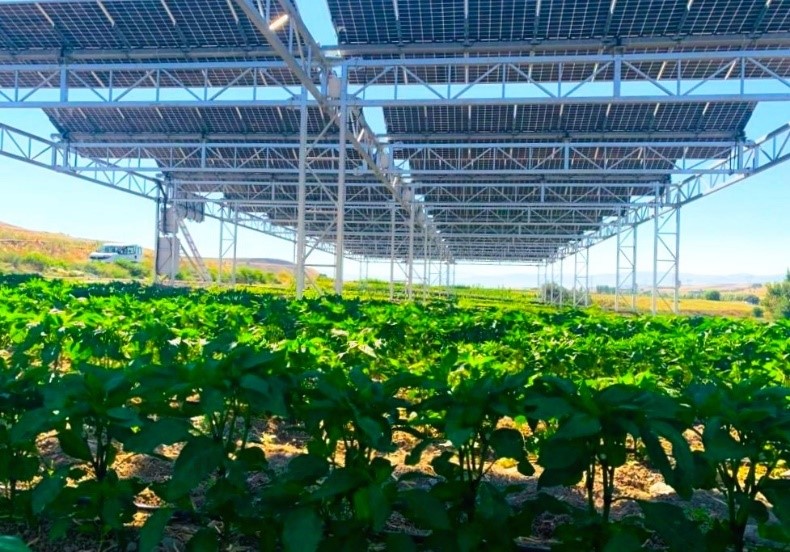Turkey has inaugurated its first agrivoltaic research project featuring a single-axis solar tracking system in the country’s Ankara province.
Located in the district of Ayaş, some 60 kilometers from the Turkish capital, the Ayaş AgriPV project was initiated by the Ayaş District Directorate of Agriculture and Forestry, the ODTÜ-GÜNAM Center for Solar Energy Research and Applications, and a local farmer.
The project is the first and most comprehensive application in Turkey of a solar power plant with a solar tracking system on an open agricultural field, according to ODTÜ-GÜNAM, part of the Middle East Technical University (ODTÜ/METU).
The 122 kWp agrivoltaics system was configured with 14 lines oriented in the east-west direction, incorporating a single-axis sun tracking system set at +55 and -55 degrees. Vehicles, including trailers and tractors, can operate under the agriPV system.
During the first-year trial, six different crops – tomatoes, peppers, cucumbers, carrots, spinach, and red cabbage – were carefully chosen and planted in accordance with the local crop pattern of Ayaş. Agricultural activities are being monitored concurrently in the reference area, which has the same surface area as the agrivoltaics site.
In addition to energy production, researchers are measuring many environmental parameters within the scope of the project, including irrigation, soil moisture and temperature. Data collection is being conducted to facilitate efficiency analyses and cultivation trials of various agricultural products are scheduled over the next four years.
ODTÜ-GÜNAM Module Technologies Division researchers, led by Associate Professor Dr. Talat Özden, will gather and disseminate in national and international platforms the analyses encompassing agricultural productivity, energy efficiency, dual-use efficiency of land, LCOE, and income-expense calculations. All results obtained from the studies will also be presented as annual reports.
Part of ODTÜ-GÜNAM’s Livinglab initiative, the project will make it possible for national and international researchers to easily test products and production processes by developing a tracker system with a control algorithm specially designed for the crops they desire to cultivate. The infrastructure has been designed to facilitate these types of research and collaborations. The remote access, programming, and monitoring of the system within the framework of Livinglab also allows rapid responses to many researchers.
Turkish companies KalyonPV, CW-Enerji and Gumbel Group also contributed to the project.
This content is protected by copyright and may not be reused. If you want to cooperate with us and would like to reuse some of our content, please contact: editors@pv-magazine.com.



1 comment
By submitting this form you agree to pv magazine using your data for the purposes of publishing your comment.
Your personal data will only be disclosed or otherwise transmitted to third parties for the purposes of spam filtering or if this is necessary for technical maintenance of the website. Any other transfer to third parties will not take place unless this is justified on the basis of applicable data protection regulations or if pv magazine is legally obliged to do so.
You may revoke this consent at any time with effect for the future, in which case your personal data will be deleted immediately. Otherwise, your data will be deleted if pv magazine has processed your request or the purpose of data storage is fulfilled.
Further information on data privacy can be found in our Data Protection Policy.